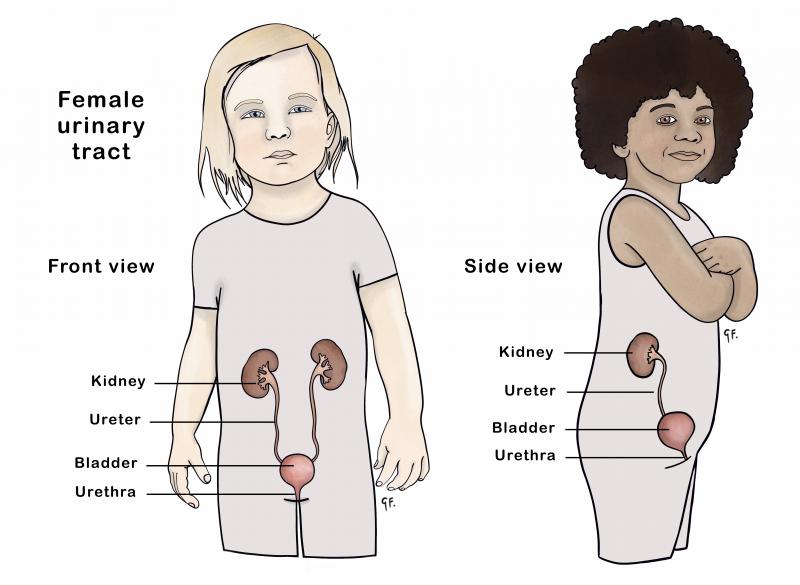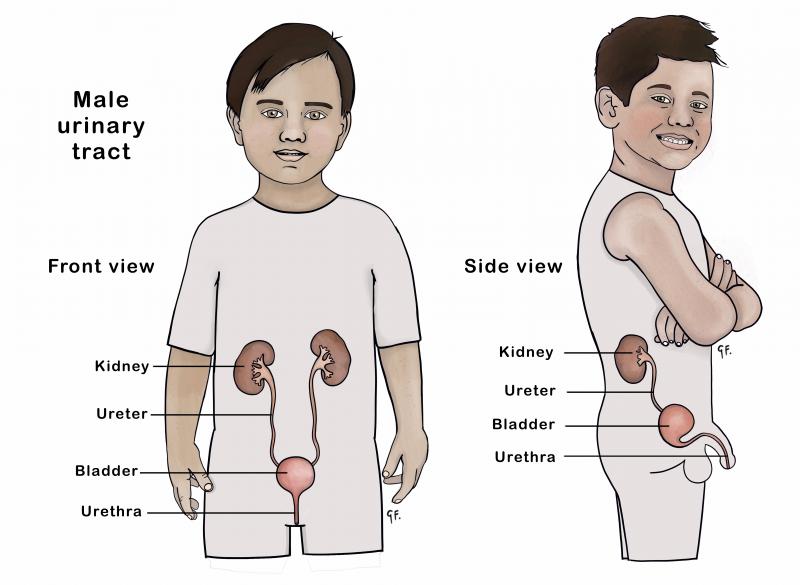Renal Biopsy
Renal Biopsy
A renal biopsy is a test to help decide what is wrong with your child's kidney. It involves taking a tiny sample of your child's kidney.
Key points about renal biopsy
- a renal biopsy involves taking a tiny sample of your child's kidney
- healthcare staff from the radiology department usually do the test
- a specialist in the laboratory will look at the sample with a microscope to figure out what is going wrong with the kidney
- your child will need an anaesthetic for the biopsy
What is the urinary tract and how does it normally work?
The urinary tract is the kidneys, ureters, bladder, and urethra.
The kidneys filter and remove waste and water from the blood to produce urine. The urine travels from the kidneys down 2 narrow tubes called the ureters. The urine is then stored in the bladder.
When your child does a wee, urine flows out of the body through the urethra, a tube at the bottom of the bladder. The opening of the urethra is at the end of the penis in boys and in front of the vagina in girls.
Front and side view of the female urinary tract.

Front and side view of the male urinary tract.

What is a renal biopsy?
A renal biopsy is a test to look directly at a tiny sample of your child's kidney. Healthcare staff from the radiology department use an ultrasound machine to guide a small needle to the correct place. There is no cut to the skin as healthcare staff use a needle for the test. Using the needle, the healthcare staff will get a tiny sample of your child's kidney. Each kidney contains hundreds of thousands of little filters and doctors remove only about 20 to 30.
Your child will need a general anaesthetic so they will be asleep during the biopsy.
Why is my child having a renal biopsy?
A renal biopsy can provide lots of detailed information about what is going on in the kidneys. Although blood and urine tests provide a lot of useful information on the function of the kidneys, a renal biopsy allows a kidney specialist to look at the structure of the filters of the kidney. This extra information helps your doctors to decide what is causing the kidney problem and on the best treatments.
Doctors will only do a kidney biopsy when the other information about your child is not enough to explain what is causing the kidney problem. The other information doctors will look at includes your child's:
- history
- blood tests
- urine tests
- ultrasound
- other tests
What happens before a renal biopsy?
Before having a renal biopsy, your child needs to have an ultrasound scan to see if they have 2 kidneys in the normal place. They will also need to have blood tests to make sure that their blood clots normally. Your paediatrican or the radiology department doing the biopsy will organise this.
As the biopsy happens under a general anaesthetic, your healthcare team give you advice about when your child needs to stop eating and drinking to be ready for the anaesthetic on the day of the test.
Read more about having an anaesthetic
What happens during a renal biopsy?
Your child will usually go to a children's ward or a short stay or day stay ward. Your child will have a general anaesthestic so they will be asleep. The biopsy itself only takes a few minutes.
What happens after a renal biopsy?
After the biopsy your child will go to recovery to wake up. Then they go back to the children's ward, or short stay or day stay ward. Your child will have a small plaster on their back. Healthcare staff will remove this after a couple of hours.
To reduce the chance of bleeding or bruising inside the kidney, healthcare staff will ask your child to lie on a bed for 5 to 6 hours after the test. Your child can eat and drink normally afterwards. If they are sore, they can have paracetamol or another painkiller. After a few hours, if everyone is happy, then you can take your child home.
Are there likely to be any complications of a renal biopsy?
Complications are very rare. They include the possibility of some bleeding afterwards, and pain. This is because there are thousands of little blood vessels inside the kidney and the test can cause some bruising inside the kidney. This should settle very quickly.
How can I prepare my child for a renal biopsy?
Check some suggestions to help your child manage their treatment
How do I find out the results of my child's renal biopsy?
Laboratory staff will do several different tests on the piece of kidney. Some of the results come back in days and some can take longer. Your paediatrician will contact you when the results are available.
What can my child expect after returning home following a renal biopsy?
Your child might feel sore for a couple of days afterwards. Giving paracetamol regularly can help with this. (You must follow the dosage instructions on the bottle. It is dangerous to give more than the recommended dose). Your child should not have ibuprofen - this can cause problems within the kidney.
Your child can go back to school after a couple of days. They should avoid playing sports for a week afterwards.
Call your paediatrician or the children's ward for advice if:
-
your child has pain in their loin or between their ribs and hip that's getting worse
-
your child's wee (urine) becomes red, or coke-coloured
-
they have a fever
This page last reviewed 12 July 2024.
Do you have any feedback for KidsHealth?
If you have any feedback about the KidsHealth website, or have a suggestion for new content, please get in touch with us.
Email us now